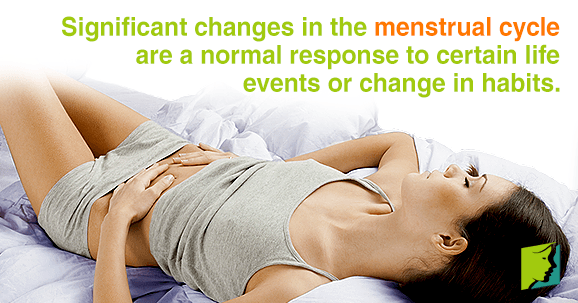Premenopause is a term describing the fertile years of a woman's life, which run from the time she gets her first period to the moment she sees her first menopause symptom. Periods usually come at roughly the same time every month; the typical menstrual cycle lasts for 28 days. However, some women have periods that are not the same every month, or are far out of the range of the average, and these are called irregular periods. A true irregular period should only be considered irregular in the context of each woman's personal “normal” pattern.
Are Irregular Periods Normal?
Although most women after puberty adjust to a more or less regular cycle during premenopause, most women do not have periods that come like clockwork. However, for some women, their periods equate to a monthly "surprise," and nothing can be predicted. Working out what is normal for you is key, so if you see no obvious pattern, then keep track of how long the intervals are between each period for a few months in order to work out your cycle.
Risk Factors for Irregular Periods
Significant changes in the menstrual cycle are a normal response to certain life events or change in habits. Normally, this is not permanent, and the periods will return to normal after a certain amount of time. However, it is important to seek medical advice if you have any concerns, as irregular periods can be a symptom of certain illnesses that require treatment. Irregular periods can be caused by the following factors.
Extreme weight change
If the body undergoes very speedy weight loss or gain, it can have a direct effect on the area of the brain that controls the reproductive cycle. Therefore, irregular periods are often a result of crash-dieting or eating disorders.
Excessive exercise
Exercising too much can sometimes cause the body to go into “survival mode,” where it attempts to save energy by not having periods. The general recommendation for exercise is 150 minutes each week. Although it is possible to exercise more than this without any problems, it is worth seeking medical advice if you think your exercise regime might be causing irregular periods.
Stress
This is also linked with "survival mode" - when the body is stressed, it saves energy where it can in order to focus on the problem at hand. Stress is a major part of the lives of many women who are going through premenopause, as they tend to have to juggle family, work, and social lives.
Irregular periods are normal during puberty and menopause and are usually not a cause for concern during these times. However, if your previously regular periods become chronically irregular, it is best to seek medical advice in order to rule out any underlying conditions.
Sources
- National Health Service UK. (2013). Causes of irregular periods. Retrieved November 11, 2014, from http://www.nhs.uk/Conditions/Periods-irregular/Pages/Causes.aspx
- National Health Service UK. (2013). Periods, irregular. Retrieved November 11, 2014, from http://www.nhs.uk/Conditions/Periods-irregular/Pages/Introduction.aspx
- National Institute of Health. (2014). What causes menstrual irregularities? Retrieved November 11, 2014, from http://www.nichd.nih.gov/health/topics/menstruation/conditioninfo/Pages/causes.aspx
- Teens' Health. (2014). Irregular Periods. Retrieved November 11, 2014, from http://kidshealth.org/teen/sexual_health/girls/irregular_periods.html



